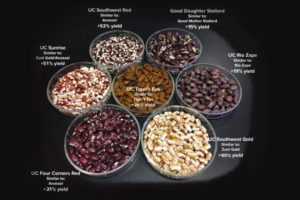
The Student Collaborative Organic Plant Breeding Education (SCOPE) project is one of many exciting developments to come out of University of California–Davis’s agricultural program. OSA is a proud collaborator on this student-led collaborative that brings together faculty, student plant breeders, and local organic growers to work together on improving crop varieties for organic farming systems in California. To learn more about UC Davis’s SCOPE project, be sure to visit their website.
Newly Released Dry Bean Varieties
One of the goals of the SCOPE project is to improve existing varieties for organic systems that are more resistant to disease, more resilient, and better suited to our changing climate. These ‘Heirlooms of Tomorrow’ are the result of collaboration to conserve useful traits from heirlooms while adapting them to modern conditions and needs. All of these varieties are registered as public domain, meaning there are no restrictions on seed saving, breeding, or selling. Seeds of the new bean varieties are available through the UC–Davis Foundation Seed Program.
‘UC Tiger’s Eye’
‘UC Tiger’s Eye’ (Reg. no. CV‐336, PI 693473) is a BC3F7 line of common bean (Phaseolus vulgaris L.) bred by recurrent backcrossing between the heirloom Tiger’s Eye (recurrent parent) and UC Canario 707 (donor parent). It produces edible seed similar to the heirloom parent but is resistant to Bean common mosaic virus and provided 28% higher yields in multiyear, multi-location replicated trials on organic farms. Cooking evaluations have also shown that its culinary quality is similar to Tiger’s Eye. UC Tiger’s Eye will serve a growing market interest in heirloom‐type common bean with improved agronomic properties.
‘UC Sunrise’
‘UC Sunrise’ (Reg. no. CV‐333, PI 693474) is a new cultivar of common bean (Phaseolus vulgaris L.) developed by crossing the heirloom type ‘Zuni Gold’ with UCD 9634 pink bean. UC Sunrise has a seed type similar to heirloom cultivars such as Zuni Gold but is resistant to Bean common mosaic virus (BCMV) and has yields 50% higher than its heirloom parent. Tastings have also demonstrated that it maintains culinary quality similar to its heirloom parent. All evaluations were conducted on certified organic farms. UC Sunrise will help fill a growing interest in heirloom‐like dry bean with improved agronomic performance.
‘UC Southwest Gold’
‘UC Southwest Gold’ (Reg. no. CV‐337, PI 693470) is a dry bean (Phaseolus vulgaris L.) descended from ‘Zuni Gold’ and UCD 9634 pink bean. UC Southwest Gold is an F3:7 line with an heirloom‐like seed coat similar to Zuni Gold but with resistance to Bean common mosaic virus and yields 60% higher than its heirloom parent. Culinary evaluations have shown that it displays cooking properties comparable to Zuni Gold. Field trials were carried out on certified organic ground. UC Southwest Gold will contribute toward satisfying an increasing market demand for more productive and economical heirloom‐type common bean cultivars.
‘UC Southwest Red’
‘UC Southwest Red’ (Reg. no. CV‐334, PI 693472) is a line of common bean (Phaseolus vulgaris L.) descended from the cross ‘Zuni Gold’/UCD 9634. UC Southwest Red is intended to address the growing demand for heirloom‐type crop cultivars, which have high market value and a reputation for excellent aesthetic and culinary quality. This demand is strongest among smaller scale farmers seeking unique market opportunities. Many of these growers operate in the organic sector and have a particular interest in high‐yield, high‐market‐value N2–fixing legumes. Despite the demand for heirloom‐type cultivars, production of many of these, including the dry bean ‘Anasazi’, is hindered by poor agronomic qualities such as low yields and disease susceptibility. To this end, UC Southwest Red combines an heirloom‐like seed pattern similar to that of Anasazi with resistance to Bean common mosaic virus (BCMV) and yields 53% higher than those of the heirloom. Evaluations of flavor and cooked appearance demonstrate that it has comparable culinary quality to Anasazi. All on‐farm evaluations were conducted on certified organic ground. UC Southwest Red will help satisfy a growing consumer interest in heirloom‐like cultivars while maintaining the agronomic qualities demanded for efficient production.
‘UC Rio Zape’
‘UC Rio Zape’ (Reg. no. CV‐335, PI 693471) is a dry bean (Phaseolus vulgaris L.) developed by recurrent backcrossing between the landrace Rio Zape (recurrent parent) and ‘Matterhorn’ great northern bean (donor parent). UC Rio Zape is a BC5F2:7 cultivar that traces approximately 98% of its ancestry to Rio Zape but demonstrates resistance to Bean common mosaic virus due to introgression of the I gene. UC Rio Zape also has yields 19% higher than its heirloom parent. It also maintains culinary quality comparable to its heirloom parent. All field evaluations were conducted on certified organic land. UC Rio Zape will serve growers and consumers interested in heirloom‐like bean that can be produced efficiently and economically.
Upcoming Trials
Interested producers in California can participate in on-farm variety trials of some of the varieties coming out of the SCOPE project. Variety trails are already underway for both wheat and tomatoes this year. See below for details and how to get involved.
Wheat Trials
Are you interested in finding wheat varieties that may work on your organic farm? University of California–Davis and Organic Seed Alliance have collected dozens of formerly patented commercial varieties that are now off-patent and available for anyone to grow and save seed from. Click here to learn more.
Tomato Trials
Are you interested in finding tomato varieties that may work on your organic farm? University of California–Davis, Cal Poly Pomona, and Organic Seed Alliance have bred several tomato varieties that we are looking to receive feedback on. Click here to learn more.
